I’ll never forget being gifted a pair of Kevin Durant’s signature basketball shoes on my seventh birthday. I immediately went out to the driveway, donning my teal and yellow KD6 sneakers, trying to recreate Durant’s best moves. It wasn’t long before a Kevin Durant jersey arrived in the mail.
That was 2012, and Kevin Durant was on top of the NBA world. Drafted just five years earlier, KD had already won Rookie of the Year, two scoring titles, and led his team to the NBA Finals. With a 7’0 frame, guard skills, an elite post-up game, and a silky shooting stroke, Durant was a freak of nature on the basketball court—the type of player you create in NBA2K when trying to conjure up the most unfathomable basketball machine possible.
An MVP trophy followed just two years later, becoming one of the most emotional moments in NBA history. During his speech, Durant choked through tears, dedicating the trophy to his mother, famously claiming, “Mom, you’re the real MVP.”
Kevin Durant was the most likable player in the sport, the beloved face of a young franchise in Oklahoma City, and well on his way to becoming the greatest player to ever grace an NBA court.
Then, it all changed.
KD leaves OKC and Becomes the Villian
From 2011–2016, Kevin Durant led the Oklahoma City Thunder to four Western Conference Finals and one NBA Finals appearance. However, things seemed to reach a breaking point in 2014 and again in 2016.
After two narrow losses in the Western Conference to historic Spurs and Warriors teams, Durant decided he had enough. In the 2016 offseason, Kevin Durant signed with the Golden State Warriors in one of those NBA moments where everyone remembers where they were when they heard the news — I was 11 years old on my couch and cried because I thought Durant would sign with the Celtics.
By joining a Warriors squad that had already won a championship and posted the best regular season record of all time (73–9) the year prior, Durant embodied the “if you can’t beat them, join them” mentality. He was immediately labeled the biggest coward in sports history, dodging the competitive path to leading a title run and joining a team that was a write-in for NBA champs each year. Durant earned the nickname “cupcake.”
Durant did not take this lightly. In his returns to Oklahoma City, he jabbed at former teammates and showed no appreciation for the fanbase that once adored him. Durant was painted as a villain —and he let it get to him.
Beyond his irritated and indifferent temperament on the court, Durant made his voice heard on social media —by accident, that is. He slammed his former teammates in OKC on Twitter, thinking he was signed into an anonymous account. The disdain for Durant only grew around the league.
Empty Championships?
Kevin Durant joined the Golden State Warriors to win championships—and he did just that. In 2017 and 2018, he not only won back-to-back titles but also took home two Finals MVPs. Statistically and stylistically, Durant was dominant.
But the broader legacy question still looms: was he ever the guy on a championship team?
Those Warriors teams were the most talented the NBA has ever seen. But Golden State had already won without Durant, posting a 73-win season and capturing a title in 2015. And after his departure, the same core —Steph Curry, Klay Thompson, and Draymond Green — won again in 2022. The Warriors didn’t need Durant to reach the mountaintop. If the Warriors were a 1,000-horsepower sports car, Durant was the tinted windows.
To be clear, this isn’t about invalidating championships. Rings matter, and Durant’s performances on those teams were spectacular. But there’s a massive distinction between contributing to a championship team and leading one.
Durant let Steph Curry steer the ship in Golden State. He focused on what he does best: scoring the basketball. There’s no shame in that. But if you want to be mentioned alongside the true pantheon of all-time greats — Michael Jordan, LeBron James, Kobe Bryant, Tim Duncan, Steph Curry — you need to be the unquestioned leader, the heartbeat of the locker room, and the engine of a championship team.
Durant avoided that challenge. He took the shortcut. And while it brought him rings, it left behind questions about his legacy that still haven’t been answered.
Brooklyn
So, Kevin Durant embarked on a new journey, looking to prove he could win a championship without riding the coattails of Stephen Curry and company.
Durant signed with the Brooklyn Nets in July of 2019, teaming up with Kyrie Irving. With an injury keeping him out early, Durant made his Nets debut in December of 2020.
Durant got his wish. He was the best player on a great team, and it was time for him to shine.
KD led the Nets to a 4–1 win over the Boston Celtics in the first round of the 2021 playoffs, before tragically losing to the Bucks in seven games the following round. Through that playoff run, Durant was phenomenal, averaging 34.3 points, 9.3 rebounds, and 4.4 assists. Things were looking up for the Nets and Durant’s legitimacy as a leader.
He averaged nearly 30 points per game the following regular seasons, but the Nets flamed out in the playoffs, getting embarrassingly swept by the Boston Celtics in Round One.
Then, the same disturbing thought seemingly reentered Durant’s head: “I can’t win here.”
Despite being surrounded by two Hall-of-Fame teammates in Kyrie Irving and James Harden, Durant demanded a trade. It was eerily reminiscent of his decision just a few years prior — but this time, the timeline was shortened.
There were murmurings of KD being a “finger-pointer,” never taking responsibility for his teams' shortcomings. But it made sense, right? As one of the most sensational talents in basketball, Durant couldn’t be to blame… or could he?
Just before anyone could ponder those questions for too long, Durant was traded to the Phoenix Suns in February of 2023.
Disaster in the Desert
This was Durant’s fourth star-studded landing spot. In the two seasons before he arrived in Phoenix, the Suns had narrowly lost in the Finals and then went 64–18 in the regular season before a disappointing second-round loss.
Alongside Devin Booker, Kevin Durant could be the veteran presence needed to push Phoenix over the hump and win their first championship.
After playing just seven games in his first season, Durant pushed for Suns up-and-coming head coach Monty Williams to be fired. Then, in Durant’s first full year in Phoenix, they went 49–33 and lost in the first round. The following year —this year —the Suns missed the playoffs entirely.
This summer, he’ll be making his way out of town after another incredibly disappointing tenure with an unbelievably talented team. Again, it’s someone else’s fault — not Kevin Durant.
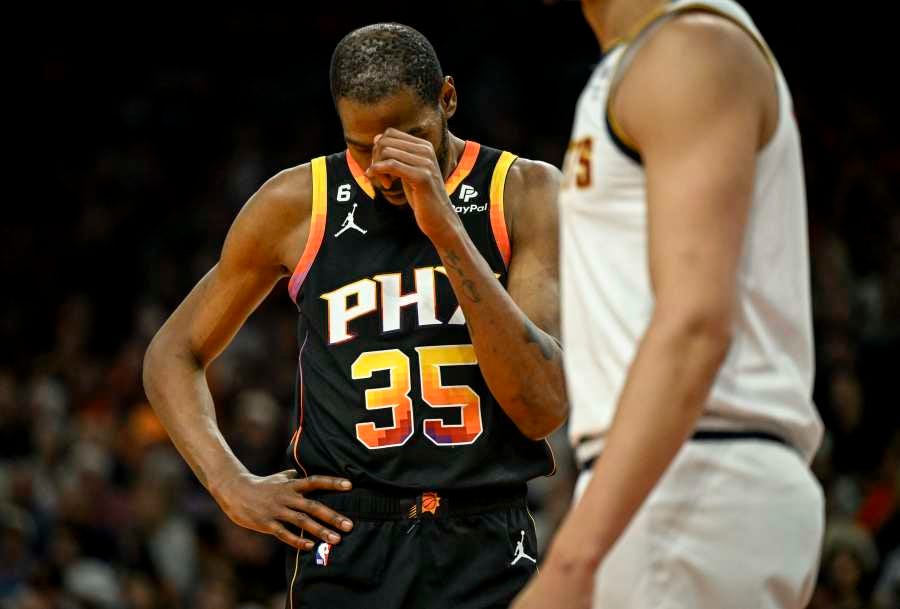
Interestingly, when the Suns tried to trade Durant at the deadline this season, they couldn’t find a trade partner. Teams were unwilling to part with a boatload of players and draft capital for an aging, unproven winner, and locker room disease. The jig is up on Kevin Durant.
The KD Conundrum
Time will only tell where Kevin Durant goes next, but the clock is ticking on his career. At 36 years old, KD’s retirement is coming sooner rather than later, and he will almost certainly end his career with just the Warriors championship rings.
Not only has Kevin Durant never been the best player on a championship team, but he has an alarming history of taking zero accountability. Whether it be his coach and supporting cast in Oklahoma City, injuries in Brooklyn, or roster management in Phoenix, Durant never takes the blame.
KD has never contributed more than his basketball talents to a team. Unfortunately, for players of his caliber, that is just half the equation. The humility, resilience, and maturity to be a leader is what sets great players apart from historic players. Kevin Durant simply does not have that trait.
While Kevin Durant has had one of the most accomplished careers in NBA history and will be a first-ballot Hall of Famer, there is an irreparable stain across his legacy. Durant coasted through the second half of his career with a sour, disinterested attitude, making the teary-eyed golden boy of Oklahoma at the NBA Awards ceremony in 2014 feel like a distant memory. After leaving OKC, he never let go of being the villain.
I’m not here to attack Kevin Durant’s personality. Although I may not agree with his temperament, I recognize that the standard for players like him is nearly unattainable. It’s hard to imagine operating well under all that pressure.
But it is a shame to see how far his legacy has fallen.
Maybe it’s too personal for me. Perhaps my feelings for Durant are far too extreme, as the OKC Kevin Durant jersey and teal and yellow shoes collected dust in my closet, and he chose Golden State over Boston. However, as the dust has settled on my disappointment with Kevin Durant — and the national media begins to question how “great” he truly is — it’s hard not to feel conflicted.
At the end of the day, the Kevin Durant who once inspired a generation now leaves behind a legacy that feels more complicated than complete. Yet, it does not seem that Durant cares. He seems content with being nothing but a historic scoring machine:
“I don’t care about legacy. I used to.”
-KD
There’s still a special place in history for figures like Durant; however, he belongs far more in the company of Reggie Miller, Charles Barkley, and James Harden than he does with Michael Jordan, LeBron James, and Kareem Abdul-Jabbar.
As the generation of NBA players that defined my childhood begins to retire in the next couple of years, Kevin Durant’s name can no longer be spoken in the same breath as Stephen Curry and LeBron James. Durant had the opportunity to surpass them a decade ago, and now he lives in their shadows.
It’s hard to label Kevin Durant’s career a disappointment. But it will forever be remembered as a story of otherworldly talent without the greatness or maturity to match. He gave us unforgettable moments, but only ever grazed his full potential. And that’s the real tragedy of it all.

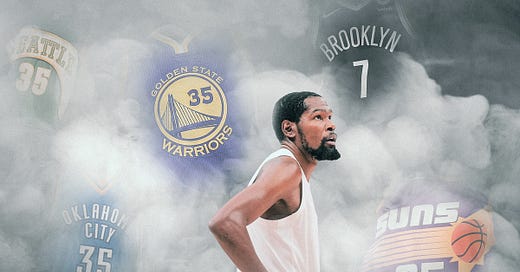


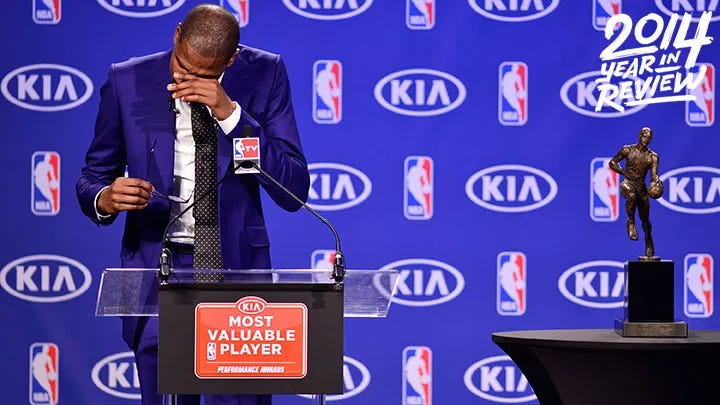
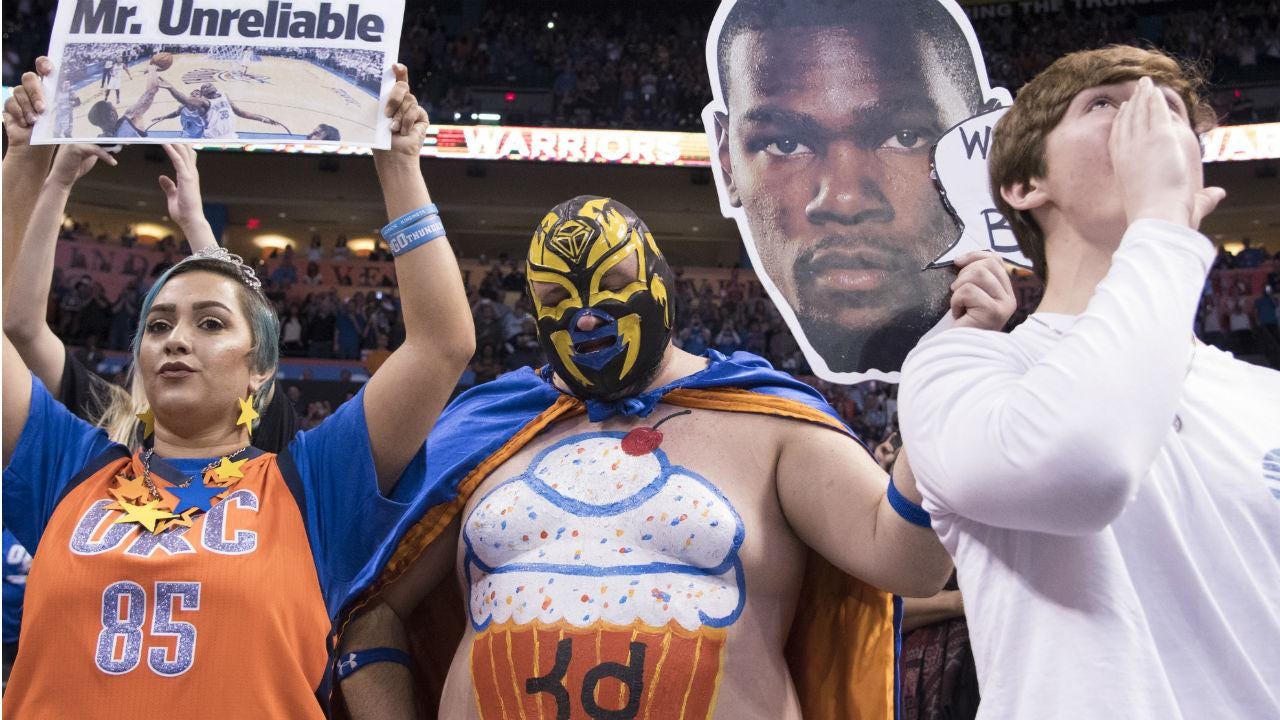
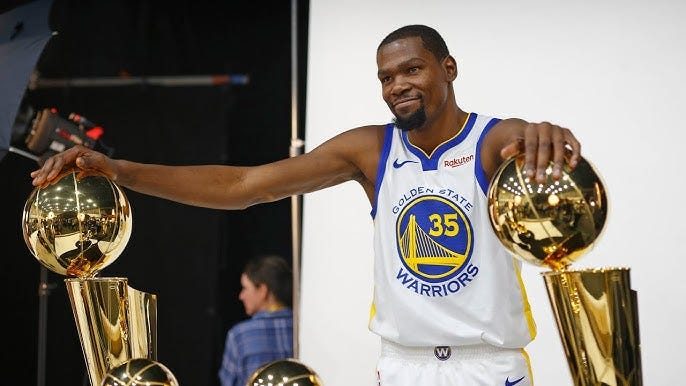
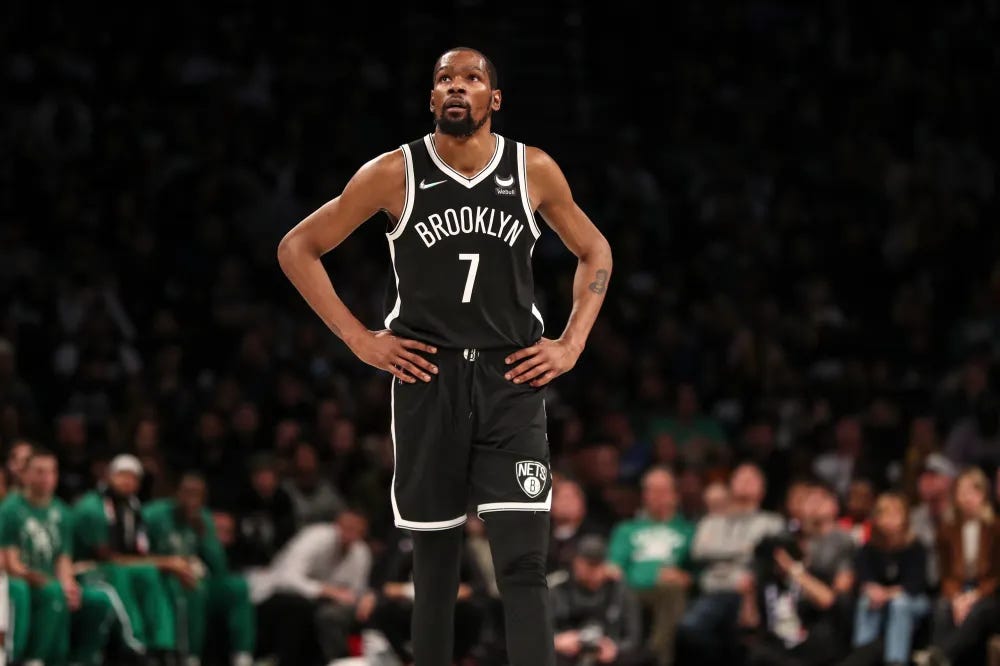
"Some happy talent and some fortunate opportunity may form the two sides of the ladder on which some men mount...[but] there is no substitute for thorough-going, ardent and sincere earnestness." Charles Dickens in David Copperfield.
No doubt the KD story is more nuanced and less one-sided than it appears: Donovan seems NBA limited, Draymond seems incredibly challenging, Kyrie seems flighty and fickle, and Suns ownership seems entirely distracted.
Yet, KD does not appear to have ever owned any of the dysfunction anywhere he has been. More importantly, he just doesn't seem to care about his teams, his teammates, his fans, or the game itself.
The "Slim Reaper" has likely 'done himself in' next year with either an (slightly) early retirement or a team that doesn't care much either.
As you point out, KD's NBA legacy is far more cautionary tale, than triumphant story. It's a terrible shame for one of the most supremely talented guys to ever play.